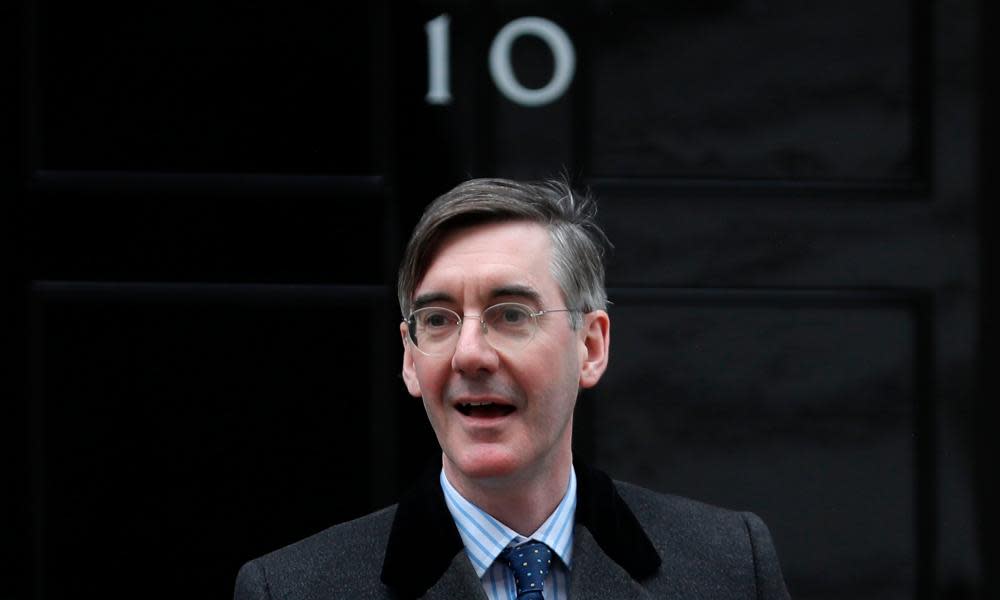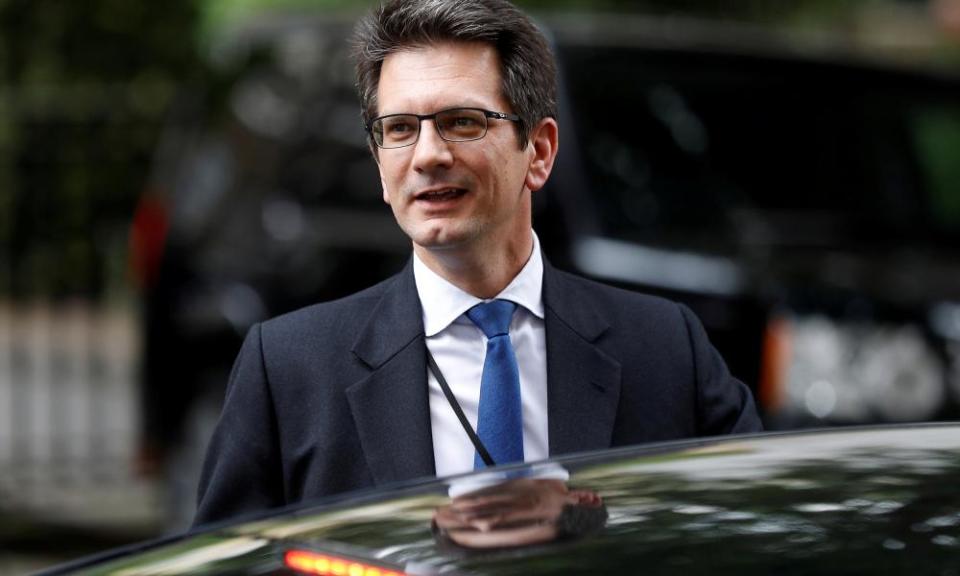'We're the opposition': Rees-Mogg and his European Research Group

As Theresa May and her weary MPs limp towards the summer recess this week, battered by late-night dramas and torn loyalties, only one faction in the bitterly divided Conservative party appears emboldened and ready for the next fight: Jacob Rees-Mogg’s European Research Group (ERG).
Funded partly by contributions from MPs’ taxpayer-funded office expenses, and with its own spinners and de facto whips who coordinate their troops on WhatsApp, the ERG is leading the fight inside the Tory party for a clean break with Brussels.
“They are a single-minded pressure group within the Conservative party who have had little regard for any long-term damage they cause the party for decades now,” says the former education secretary Nicky Morgan. “They are our version of Momentum.”
Once the prime minister persuaded her cabinet to sign up to the Chequers agreement, with regulatory alignment in key sectors, it was inevitable there would be a backlash from the ERG, but its ferocity and scale has taken Downing Street by surprise.
Seeking ways of demonstrating their numbers in parliament, members of the group tabled four amendments to this week’s customs bill, aimed at wrecking the Chequers deal, including May’s “facilitated customs arrangement”.
At the last minute, and to the fury of remainers, the government simply accepted them all, raising questions about whether some aspects of the deal would even be legal as a result.
That was only one of a series of destabilising manoeuvres, including a drip, drip of resignations, with more expected to follow, particularly if May is forced into further concessions by the EU27.
The ERG’s game has noticeably stepped up a gear since the return of Steve Baker, the pugnacious former RAF engineer who resigned as a Department for Exiting the European Union (DexEU) minister in David Davis’s slipstream.

“Steve is a wartime consigliere, and he’s battle-hardened,” says one senior Conservative. “We’re the opposition – and we have a plan,” says another.
Baker has already made a series of pointed interventions in the Commons – demanding the publication of DexEU documents, for example – that underline his determination to use every weapon at MPs’ disposal against the government of which he was so recently a part.
He has highlighted how much planning for a no-deal Brexit, the issue for which he was responsible, has already been done, in an attempt to undermine the idea that such an outcome would be a catastrophe.
One source of the ERG’s power is its sheer numbers. When Conservative whips were trying to explain to furious remainers why they had caved in to Rees-Mogg and his colleagues, they told them the ERG had up to 80 MPs ready and willing to vote against the Chequers deal.
Baker appeared to underwrite that estimate himself in the Commons on Wednesday, telling MPs: “The number 40 [of hard Brexiters] has been bandied around in this house in the last few days, and I’m sorry to say, and it gives me no pleasure to say it, but the thing I have to say is – and the rest.
“People who have said the number 40 are not out by a fraction when they come to consider the number of members who don’t like this deal on these benches and are willing to vote in line with this dislike, they are out by a factor, not a fraction.”
It mustered 62 MPs in February, who put their names to a public letter making a series of demands about the Brexit deal, including “full regulatory autonomy” – a long way from the “common rulebook” for goods and agrifood the government is now advocating.
These included veteran MPs for whom leaving the EU has long been an overriding goal, such as Peter Bone and Bill Cash, but also new entrants from 2017 such as Rachel Maclean and Stephen Kerr, underlining the fact that the desire for a clean break is not just confined to Tory dinosaurs.
WHO'S IN:
Jeremy Hunt
The longest-serving health secretary - having held the role for almost six years - becomes foreign secretary after Boris Johnson's resignation.
Matt Hancock
The former culture secretary replaces Hunt as health secretary.
Jeremy Wright
The former attorney general takes on Hancock’s old job as culture secretary.
Geoffrey Cox
The Devon MP is promoted to be attorney general and will attend cabinet.
Dominic Raab
The former housing minister is promoted to Brexit secretary after the resignation of David Davis.
WHO'S OUT:
David Davis
Goes to the backbenches after kicking off the ministerial reshuffle with his resignation as Brexit secretary over Theresa May's negotiation plans.
Boris Johnson
The gaffe-prone and controversial foreign secretary joins Davis on the backbenches after also quitting his role.
The ERG’s other great tactical advantage is its sheer ruthlessness. For many, though by no means all, of its members, securing Brexit, and specifically a deal that allows Britain to break from the EU’s rules and tariffs, is the political objective that trumps all others.
MPs on both sides of the Tory party civil war agree that the Eurosceptics are simply more willing to “blow the bloody doors off”, as the political scientist Philip Cowley of Queen Mary University of London jokingly put it recently.
The former attorney general Dominic Grieve was a passionate advocate for the cause of ensuring parliament could avoid a no-deal Brexit. But when May urged him personally not to destabilise her government by defeating it on the EU withdrawal bill, he graciously climbed down, citing “what my right honourable friend the prime minister has told me about her anxieties” – and voted against his own amendment.
Rees-Mogg has repeatedly professed his loyalty to May but has made clear the approach to Brexit set out in the white paper is “not something I would vote for nor is it what the British people voted for”.
The ERG’s hand has also been strengthened by the two cabinet big beasts who have returned to the backbenches, Davis and Boris Johnson.
While the pair did not coordinate their departures, and Davis is more closely linked to the ERG, hard Brexiters hope the two resignations in particular will filter out to the public consciousness and create a perception that all is not well with the government’s approach.
Downing Street hopes that by dispatching MPs back to their constituencies for the summer recess, which they tried and failed to do a few days early last week, their opportunities for plotting and muttering will be minimised.
But the hardliners believe their argument will only benefit from a bracing few weeks in the company of grassroots members and voters, at the garden fetes, hospital visits and fundraisers that still punctuate the life of a local MP.
“MPs are going to go back to their constituencies and what they’re actually going to get is constituency associations saying: ‘This is terrible, we’re going to lose this seat,’” said one leaver.
Johnson used his resignation speech to frame the argument that the Vote Leave veteran and the ERG’s outriders now plan to hammer home consistently over the summer: that voters won’t wear Chequers.
A series of recent polls have shown Labour moving ahead of the Conservatives. The latest Opinium poll for the Observer, had the Tory vote dropping by six points since early June to 36%, apparently as a result of a resurgence in support for UKip, whose support increased from 3% last month to 8%.
The clean-Brexiters believe this wobble can only help them, by sowing alarm in Conservative seats about the potential impact of the compromise deal set out at Chequers. The fact they are prepared to seize on a decline in their own party’s public popularity to hammer home their point underlines the ruthless nature of the enemy May is now facing.
Johnson, Ress-Mogg and Davis have all professed their loyalty to May in recent days. But few at Westminster doubt that her future is threatened if she fails to get the ERG back onside. As one senior leaver put it: “If she gets anything through the Commons that lets down Brexit, the next day, there would be a no confidence motion, and it would pass.”

 Yahoo News
Yahoo News 
